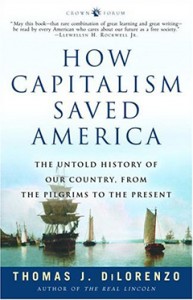 I am getting more into “How Capitalism Saved America.” The topic in chapter 3 is the experience of the early settlers in what was to become the United States. In both Jamestown and Plymouth a collectivist approach was initially used, where all the people in the colony worked “to support the colony and to generate profits” for the underwriters of the colony.
I am getting more into “How Capitalism Saved America.” The topic in chapter 3 is the experience of the early settlers in what was to become the United States. In both Jamestown and Plymouth a collectivist approach was initially used, where all the people in the colony worked “to support the colony and to generate profits” for the underwriters of the colony.
William Bradford, whose “Of Plymouth Plantation” is considered the most important and influential source of information on the Plymouth colony, came to understand well the downside of such a collectivist plan, its destroying the incentive to work harder or be more productive.
For the young men, that were most able and fit for labour and service did repine [to be fretfully discontented; fret; complain] that they should spend their time and strength to work for other men’s wives and children without any recompense. The strong, or men of parts, had no more division of victuals and clothes than he that was weak and not able to a quarter the other could; this was though injustice…And for men’s wives to be commanded to do service for other men, as dressing their meat, washing their clothe, etc., they deemed it a kind of slavery, neither could many husbands brook [to bear; suffer; tolerate] it.
Things seem to be coming back around full circle in America. The starving early colonies embraced private property, which encourages industry as you were able to reap the benefits of your increased effort, and began to prosper. Where early settlers working communally were reduced to trading their clothes, furnishings, and even their service, to the natives to stay alive (assuming they didn’t starve to death first), after establishing property rights, they grew so much food that they were able to trade the surplus with the natives for furs and other items. “That is, the colonists and the Indians began to engage in peaceful market exchange based on the division of labor.”
Today, increasingly we are being called on “to serve the needs of the community” and property rights are being eroded all around us. If the trend continues, can there be much doubt that we will find ourselves in essentially the same position as the early colonists in this new wold?
“Starving” in a land of plenty.

Pingback: A Look Back and a Look Ahead - Order From Chaos